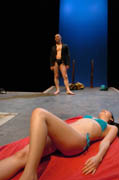
ROBERT HICKS
Gregory Burke's "The Straits"
59E59, 59 East 59th St., Theater A, June 16-July
3, 8:00 pm, $30-50.
Presented by Paines Plough in a co-production with Drum Theatre Lymouth and
Hampstead Theatre. American premiere.
(212) 279-4200 or www.ticketcentral.com
Reviewed by Robert Hicks on June 17, 2004.
 |
| James Marchant as Doink and Alice O’Connell as Tracey. Photo by Douglas Robertson |
It's an extraordinary summer in the lives of these four teenagers who are fighting the local lads over a lucrative fleet of octopus that have hit the Rock. Doirk, 16, is the ringleader of the group. His hatred of the local Hispanic youth who live in nearby Camp Bay fuels his desire to sell their octopus bounty and gain dominance in Rosia Bay. Even though the local Gibraltarans have adopted British customs and names under colonialism, Doink still thinks they are not British.
His snorkelling buddy Jock, 18, is Scottish and plays football on the Gibraltarans winning team that defeated Doink's team, Navy Colts. Doink wants to become a Marine like his brother Steve who is fighting and eventually dies in the Falklands. Jock wonders what it is like to kill a man.
Darren, 15, is a relative newcomer to Rosia Bay. He's naïve and he doesn't even know the location of the Falklands. Though he enjoys watching pirate copies of "Rambo," he lacks Doink's and Jock's machismo. But he still admires Doink's understanding of life. His peers challenge him to go on a long-distance run up the Rock to prove his manhood.
Tracy, 17, worries about her younger brother Darren's safety. She knows he's been bullied in the past and she fears he can't handle the danger of real fighting in the Army. Bright and studying for her A levels, Tracy has gotten into her own kind of trouble by being caught in a bar with a sailor. She introduces an unexpected sexual component into these boys' world of male confidences and male camaraderie.
Burke's play is a compelling coming-of-age story. But it also examines the powerful forces of racial intolerance, colonialism, violence and war. It shows just how numbed we can become to the loss of life. Near the play's end, Darren finally kills a young Hispanic Gibraltaran with his spear gun. He feels no remorse. Far removed physically from actual war, these teenagers now know firsthand what it is to kill a man. Darren is no longer scared, but he is now full of hatred just like Doink and he has lost his innocence.
All of us, Burke implies, have become casualties of war. We must live with
the guilt and the consequences of our actions. Choreographer Steven Hoggett
used hip-hop movement and military calisthenics to underscore these themes
of the teenagers' dangerous nationalism. Composer and sound designer Cormac
O'Connor introduced contemporary British club music and the Sex Pistols' version
of "God Save The Queen" in between scenes and he added a young girl's
recitation over an electronic nursery rhyme at the end of the play to drive
home the theme of lost innocence with a nihilistic conclusion that Britain's
youth have no future. [Hicks]
| museums | NYTW mail | recordings | coupons | classified |
